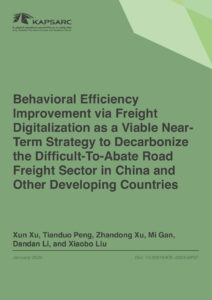The Potential Role of Truck-Hailing and Operational Efficiency Improvement in Decarbonizing China’s Medium- and Heavy-Duty Road Freight Transport
Truck-hailing is a relatively new Uber-like business model that connects road freight carriers with shippers via mobile apps. First appeared around 2013, it has achieved fast market uptake in China, involving almost 8 million commercial trucks annually by the end of 2023. With China being one of the world’s largest road transport carbon emitters, it is crucial to understand the potential climate implications of this emergent trend. Here we utilize a large national proprietary truck-hailing sample and a transport-energy-emission model to explore the potential role of truck-hailing and logistics improvement under multiple scenarios. We found that under optimistic scenarios, logistics improvements as a potential result of high market penetration of truck-hailing services could significantly reduce road freight emissions in China, and there could be potential synergies between logistics improvements and technological advancement. We also found that operational performance limitations (range and capacity) of zero-emission vehicles could have moderate emission impacts.
11th February 2025
